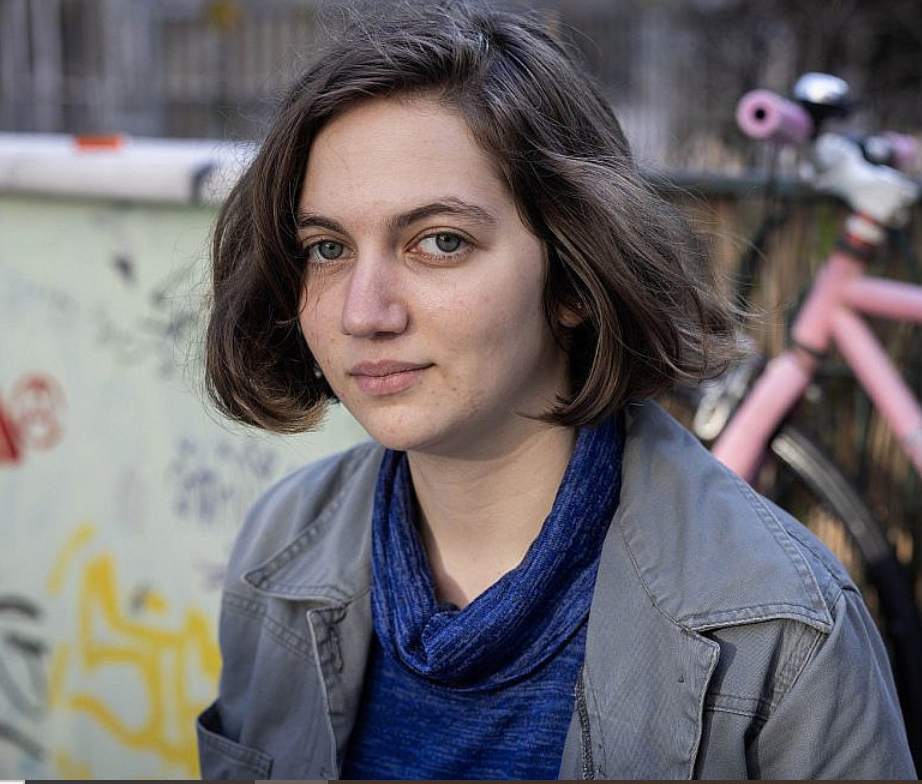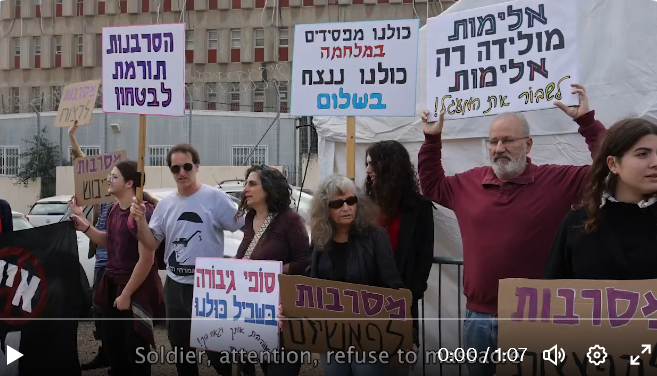
By Oren Ziv
From +972 Magazine | Original Article
Conscientious objector Sofia Orr explains why she never wavered in her decision despite the crackdown in Israel against opponents of the war.
On Sunday morning, 18-year-old Israeli conscientious objector Sofia Orr arrived at the army’s recruitment center near Tel Aviv and declared her refusal to enlist in mandatory military service in protest of Israel’s war on Gaza and long-standing occupation. The second Israeli teenager to publicly refuse the draft for political reasons since October 7 — following Tal Mitnick who did so in December — Orr was sentenced to an initial 20 days in Neve Tzedek military prison, which will likely be extended if she continues to refuse to enlist.
“The current atmosphere is much more violent against my beliefs, so obviously I’m more afraid, but I think that in these times the most important thing is to express a voice of resistance,” she told +972 and Local Call in an interview last week. “I choose to refuse because there are no winners in war. We’re seeing it now more than ever. All people, from the Jordan River to the [Mediterranean] sea, are suffering from this war, and only peace, a political solution, and the presentation of an alternative can lead to real security.”
Orr explained that she had already decided to refuse her mandatory conscription long before the war began, because of “the occupation and oppression that the army enforces against Palestinians in the West Bank.” The Hamas-led October 7 attacks, she said, “showed us once again that violence only leads to more violence and that we must solve this peacefully rather than through more violence.”
Approximately 30 left-wing activists, most of them teenagers, accompanied Orr to the recruitment center. They held a protest in support of her decision to refuse, arousing the interest of several ultra-Orthodox yeshiva students who had come to get exemptions from military service.
Thousands of Israeli teenagers are exempted from the draft every year, primarily on religious grounds, but only a handful declare themselves to be politically opposed to military service. In addition to variable prison time, conscientious objection can shrink career prospects and result in social stigmatization.
Sofia Orr arrives at the IDF’s Tel Hashomer recruitment center, near Tel Aviv, to declare her refusal to enlist in mandatory military service, February 25, 2024. (Oren Ziv)
Nonetheless, Orr was one of 230 Israeli teens who signed an open letter in early September, prior to the war, announcing their intention to refuse their draft orders as part of a wider protest against efforts by Israel’s far-right government to restrict the power of the judiciary. Connecting the judicial overhaul to Israel’s long-standing military rule over Palestinians, the high schoolers — who organized under the banner of “Youth Against Dictatorship” — declared that they would not join the army “until democracy is secured for all who live within the jurisdiction of the Israeli government.”
With the vast majority of the Israeli public fully supportive of the army’s assault on Gaza in the wake of October 7, and with left-wing activists facing heavy-handed police repression and doxxing for taking a stand against the war, the stakes for conscientious objectors have been raised even higher. In the following interview, which has been edited for length and clarity, Orr explains why she never wavered in her decision to refuse.
How did you come to the decision to refuse military service?
I’ve always felt more of a commitment to people than to states, but [my opposition to the draft] started to become clear to me when I was about 15. I started asking myself questions: Who would I actually be serving in my military service, and what would I be helping them to do?
I understood that if I enlisted, I would be taking part in and normalizing a decades-long cycle of violence. I realized that not only could I not do that, I had to do everything I could to put an end to it and resist it.
By speaking out about what enlistment means to me, I hope it gets other people thinking about their enlistment, and whether they believe it does good. I do this with empathy, solidarity, and love for all Israelis living in Israel and for all Palestinians living in Gaza and the West Bank, regardless of nationality or religion — simply out of the belief that every human being deserves to live a life of security and dignity.
Activists protest in support of draft refuser Sofia Orr, Tel Hashomer recruitment center, near Tel Aviv, February 25, 2024. (Oren Ziv)
You formed your opinions during years in which many liberal Israelis were protesting against the government — at the “Balfour” protests in Jerusalem in 2020, and the “Kaplan” protests in Tel Aviv in 2023. Were you active in those movements?
Those protests were important, but they didn’t focus on what I believe is the root of the problem. So it was very important for me to go there and expand the discussion. Israeli society tries very hard to ignore the occupation and the Palestinians, thinking that this problem will pass. But it isn’t passing, as we see now. The problem doesn’t go away just because you stop looking at it. It stays, and continues to grow until it finally explodes.
What has been the reaction to your decision, among friends, family, and schoolmates?
Most people think I’m weird and don’t understand what I’m talking about. They say I’m naïve and selfish, and sometimes also that I’m antisemitic, a traitor, and that they wish me all kinds of violent things. Luckily, that’s not among my most immediate circles, but I have received responses from both friends and relatives that were not easy.
It got much worse after October 7 with the wave of “’disillusioned” — people who before October 7 believed there was a possibility of a [peaceful political] solution, and after that lost hope in the possibility. But October 7 only proved that a political solution is necessary, otherwise the violence will just continue.
There is an unprecedented desire for revenge in Israeli society. Do you see your refusal as an attempt to persuade the public or as a declarative action in the face of this wave?
It’s important for me to do this even if I don’t convince anyone. It’s the right thing to do. But I don’t know if I would have done this publicly if I didn’t have some hope that people could hear and listen and that there was still room for conversation. It’s very important to reach Israeli society, especially the young people who stand where I stand, and show them why I chose what I chose.
Sofia Orr arrives at the IDF’s Tel Hashomer recruitment center, near Tel Aviv, to declare her refusal to enlist in mandatory military service, February 25, 2024. (Oren Ziv)
Do you have friends or acquaintances who are currently serving in Gaza?
Inside Gaza — no. But I have many friends who serve or served in the army. I want the best for them too. I want the state to stop sending soldiers to die. I want them to be able to live a normal life — but they don’t see it that way.
Did meeting Palestinians help you arrive at the decision to refuse?
My views were already relatively consolidated even before I started meeting Palestinians, but that helped to make it tangible: to meet people who we grow up being told are our enemies, and to see that they are ordinary people just like me, who want to live their lives just like me. There’s a serious problem of dehumanization, so these encounters are really important. The moment you stop believing that Palestinians are people, it’s much easier to dismiss the idea that their lives are worth something, and to kill them without thinking twice.
Do you have concerns about going to prison, especially in the current climate?
“Yes, without a doubt. The current atmosphere is much more violent and extreme against my beliefs and my decision. So it goes without saying that I’m more afraid of both the prison time and the external reaction. But that’s also what makes it more important to me. In these times it is most important to express this voice of resistance and solidarity, not to stand idly by.”
A version of this article was first published in Hebrew on Local Call. Read it here.
__________________________________________________________________________________________________________

